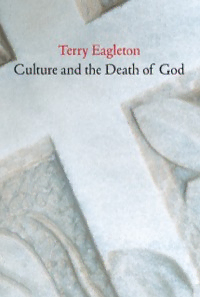
Culture and the Death of God PDF
Preview Culture and the Death of God
CULTURE AND THE DEATH OF GOD 44228877..iinndddd ii 1199//1122//1133 77::3388 PPMM 44228877..iinndddd iiii 1199//1122//1133 77::3388 PPMM C U LT U R E AND THE DEATH OF GOD terry eagleton YALE UNIVERSITY PRESS NEW HAVEN AND LONDON 44228877..iinndddd iiiiii 1199//1122//1133 77::3388 PPMM Copyright © 2014 Terry Eagleton All rights reserved. This book may not be reproduced in whole or in part, in any form (beyond that copying permitted by Sections 107 and 108 of the U.S. Copyright Law and except by reviewers for the public press) without written permission from the publishers. For information about this and other Yale University Press publications, please contact: U.S. Office: [email protected] www.yalebooks.com Europe Office: [email protected] www.yalebooks.co.uk Set in Arno Pro by IDSUK (DataConnection) Ltd Printed in Great Britain by Gomer Press Ltd, Llandysul, Ceredigion, Wales Library of Congress Cataloging-in-Publication Data Eagleton, Terry, 1943 Culture and the death of God/Terry Eagleton. pages cm ISBN 978–0–300–20399–8 (cl: alk. paper) 1. Religion—History. 2. God. 3. Enlightenment. 4. Religion and culture. I. Title. BL98.E24 2014 200—dc23 2013041989 A catalogue record for this book is available from the British Library. 10 9 8 7 6 5 4 3 2 1 44228877..iinndddd iivv 1199//1122//1133 77::3388 PPMM For Denys Turner 44228877..iinndddd vv 1199//1122//1133 77::3388 PPMM 44228877..iinndddd vvii 1199//1122//1133 77::3388 PPMM Contents Preface viii 1 The Limits of Enlightenment 1 2 Idealists 44 3 Romantics 95 4 The Crisis of Culture 119 5 The Death of God 151 6 Modernism and After 174 Notes 209 Index 224 44228877..iinndddd vviiii 1199//1122//1133 77::3388 PPMM Preface Those who find religion boring, irrelevant or offensive need not feel too deterred by my title. This book is less about God than about the crisis occasioned by his apparent disappearance. In pursuit of this subject, it begins with the Enlightenment and ends with the rise of radical Islam and the so- called war on terror. I start by showing how God survived the rationalism of the eighteenth century, and conclude with his dramatic reappearance in our own supposedly faithless age. Among other things, the narrative I have to deliver concerns the fact that atheism is by no means as easy as it looks. Religion has been one of the most powerful ways of justifying political sovereignty. It would be absurd, to be sure, to reduce it to such a function. If it has provided a craven apology for power, it has also acted from time to time as a thorn in its side. Yet God has played such a vital role in the maintenance of political authority that the waning of his influence in a secular age could not be greeted with equanimity even by many of those who had not the faintest belief in him. From Enlightenment Reason to modernist art, a whole range of phenomena therefore took on the task of providing 44228877..iinndddd vviiiiii 1199//1122//1133 77::3388 PPMM Preface surrogate forms of transcendence, plugging the gap where God had once been. Part of my argument is that the most resourceful of these proxies was culture, in the broad rather than narrow sense of the term. All of these stopgaps had other business in hand. They were not just displaced forms of divinity. Religion has not survived simply by assuming a number of cunning disguises, any more than it has been secularised away. Yet despite the fact that art, Reason, culture and so on all had a thriving life of their own, they were also called on from time to time to shoulder this ideological burden, one to which they invariably proved unequal. That none of these viceroys for God turned out to be very plausible is part of my story. The Almighty has proved remarkably difficult to dispose of. Indeed, this is perhaps the most extraordinary aspect of the narrative the book has to tell. Again and again, at least until the advent of postmodernism, what seems like an authentic atheism turns out to be nothing of the kind. Another recurrent feature of my argument is the capacity of religion to unite theory and practice, elite and populace, spirit and senses, a capacity which culture was never quite able to emulate. This is one of several reasons why religion has proved easily the most tenacious and universal form of popular culture, though you would not suspect so by leafing through a few university cultural studies prospectuses. The word ‘religion’ crops up in such literature about as often as the sentence ‘We must protect the values of a civi- lised elite from the grubby paws of the populace.’ Almost every cultural theorist today passes over in silence some of the most vital beliefs and activities of billions of ordinary men and women, simply because they happen not to be to their personal taste. Most of them are also ardent opponents of prejudice. ix 44228877..iinndddd iixx 1199//1122//1133 77::3388 PPMM
Description:The author reflects on the unique capacities of religion, the possibilities of culture and art as modern paths to salvation, the so-called war on terror’s impact on atheism, and a host of other topics of concern to those who envision a future in which just and compassionate communities thrive. Lucid, stylish, and entertaining in his usual manner, Eagleton presents a brilliant survey of modern thought that also serves as a timely, urgently needed intervention into our perilous political present.
